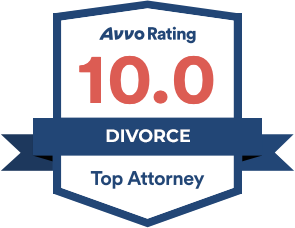
Charlotte Divorce Attorney
Experienced Divorce Lawyer Serving Mecklenburg County, NC
What Are North Carolina’s Divorce Laws?
Divorce in North Carolina is a multifaceted process governed by state laws that encompass various aspects of marital dissolution. As a “no-fault” divorce state, couples can seek divorce based on the grounds of living separately and apart for at least one year. However, fault-based grounds such as adultery, abandonment, and cruelty are also recognized. Before filing for divorce, couples must undergo a mandatory separation period, adding a layer of complexity to the process. Navigating these legal intricacies requires the expertise of seasoned Charlotte divorce attorneys who can provide personalized guidance and representation tailored to each client’s unique circumstances.
Our North Carolina Divorce Services
Whether facing a contested divorce, uncontested divorce, or complex marital dissolution, our firm offers a comprehensive range of divorce services to address our clients’ diverse needs:
- Contested Divorce: In cases where spouses cannot agree on key issues such as child custody, property division, or spousal support, we provide assertive representation to protect our clients’ rights and advocate for their interests in court.
- Uncontested Divorce: For couples seeking an amicable resolution, we facilitate uncontested divorces, guiding them through the process efficiently and cost-effectively while ensuring that their rights are safeguarded.
- High-Asset Divorce: In complex divorce cases involving substantial assets, business interests, or investments, our attorneys have the experience and resources to handle intricate financial matters and property division issues with precision and diligence.
- Child Custody and Support: We prioritize the well-being of children in divorce proceedings, advocating for fair and workable child custody and support arrangements that serve their best interests.
- Spousal Support (Alimony): Whether seeking or contesting spousal support, our attorneys provide skilled representation to achieve equitable outcomes that address our clients’ financial needs and circumstances.
- Mediation and Alternative Dispute Resolution: When appropriate, we explore mediation and alternative dispute resolution methods to help clients resolve conflicts outside of court, promoting cooperative solutions and minimizing conflict.
Is North Carolina a No-Fault Divorce State?
North Carolina is a “no-fault” state. This means that either spouse can file for and ask the Court to enter a Divorce Judgment to officially and lawfully end the marriage without the consent of the other party, without the signature of the other party, and without a finding that one spouse is at fault for the end of marriage.
What is Absolute Divorce?
An absolute divorce is the process for legally ending a marriage. Before the North Carolina Court can grant your divorce, you must meet the following requirements:
- (a) You physically separate from your spouse.
- (b) You live separately and apart from one another with one spouse having the intent to remain separate.
- (c) You actually live separate and apart from one another for at least 366 days.
- (d) Either you or your spouse must be a resident of North Carolina for at least six (6) months prior to the date of filing the Complaint for Divorce.
Why You Should Hire a Divorce Lawyer
Working with a lawyer during a divorce provides invaluable legal experience and guidance, ensuring your rights and interests are protected throughout the entire process. A divorce in North Carolina involves complex legal procedures and paperwork. Working with a skilled Charlotte divorce lawyer can help you navigate these complexities, reducing the risk of errors that could lead to unfavorable outcomes. Our legal team is well-versed in state-specific divorce laws and can offer strategic advice tailored to your unique situation. We assist in negotiating fair settlements, whether its asset division, child custody, or spousal support, and can represent their client’s interests in court if necessary.
Additionally, working with a skilled lawyer can significantly reduce the emotional burden associated with going through a divorce. The process can be highly stressful and emotionally taxing. An attorney can provide objective, rational advice, helping you make informed decisions rather than ones driven by emotion. Our law firm can act as a buffer between you and the other parties, facilitating more constructive communication and potentially reducing conflict. Moreover, by handling the legal aspects of the divorce, we enable you to focus on personal healing and adjusting to life changes, knowing that your case is in capable hands.
How Our Charlotte Divorce Lawyers Can Help
Whether you are considering divorce or have already made your final decision, you are going to need an experienced legal advocate on your side. That’s where the Charlotte divorce attorney of Miller Cushing Holladay can help. With our more than 35 years of combined experience, we can help you through this difficult time by representing your interests and fighting for everything you deserve.
Reach our to our team at Miller Cushing Holladay by calling 980-321-5590 or contacting us online for personalized assistance from our experienced Charlotte divorce lawyer!
Commonly Asked Questions
What Legal Issues Must be Resolved Before Divorce Judgement?
While the process for obtaining a Divorce Judgment is often a straightforward process, the entry of the Divorce Judgment is an important event which affects legal rights and can have catastrophic repercussions if you do not plan and prepare.
Because the Divorce Judgment terminates all marital rights between the spouses, if a claim for alimony or equitable distribution has not been filed with the Court before the Divorce Judgment is entered, those claims are forever barred.
There are many factors people fail to consider when undergoing divorce:
- Shared insurance policies will need to be separated.
- Paying alimony will provide tax breaks, while receiving alimony must be reported as taxable income.
- You should have your most valuable assets appraised to help you determine what is most worth fighting for.
- You could be held responsible for debt accrued by your soon to be ex-spouse.
As Charlotte divorce attorneys, we’ve proven we understand the complexities of these cases. We can help you navigate the numerous pitfalls of divorce so that you are not blind sighted when the day comes to make final decisions.
Contact our Charlotte divorce attorney by calling 980-321-5590 today to schedule your consultation!
How Long Does Divorce Take in North Carolina?
It depends on several factors, including the complexity of the case, the level of agreement between the spouses, and the court’s schedule, how long it takes for a divorce to be finalized in North Carolina. However, there are some general timelines and requirements to consider.
A couple must separate for one year before filing for divorce in the state. In other words, spouses must live separately and apart for at least one continuous year in order to end their marriage. During this time, they cannot resume cohabitation, even briefly, as this would reset the separation period.
Once the one-year separation requirement is met, one spouse can file a complaint for absolute divorce. After filing, the other spouse must be formally served with the divorce papers. They have 30 days to respond, with a possible 30-day extension if requested.
If both parties agree on all terms and there are no contested issues, the divorce process can proceed relatively quickly. An uncontested divorce might be finalized within 60 to 90 days after filing. It can take much longer if there is a dispute over property division, child custody, or spousal support, depending on the complexity and the court’s backlog.
The minimum time frame for a contested divorce in North Carolina is just over a year due to the mandatory separation period, but the actual duration can vary widely based on individual circumstances.
Defining “Separate and Apart” in North Carolina Divorce Law
Many North Carolinians ask what it means to live “separate and apart” and what may and may not qualify as legal separation to begin the 366-day waiting process.
Our Courts have repeatedly ruled that to be “separate and apart,” spouses must live in separate residences from one another and one spouse must do so with the intent to remain separate and apart thereafter.
For example, sleeping in separate bedrooms or one spouse sleeping on the couch in the same home does not qualify as “separate and apart” to begin the 366-day waiting period.
Mediation and Collaborative Divorce
When going through a divorce, it’s important to consider alternative dispute resolution methods such as mediation and collaborative divorce. These options can help minimize conflict, reduce legal costs, and allow both parties to have more control over the outcome.
Benefits of mediation and collaborative divorce include:
- Less adversarial than traditional litigation
- More efficient and cost-effective
- Promotes open communication and cooperation
- Allows for creative solutions that benefit both parties
Our experienced Charlotte divorce lawyers can guide you through the mediation or collaborative divorce process and help you reach a fair and amicable resolution.
You Might Also Be Interested In…

-
“Bethany was encouraging of questions and seems very knowledgeable”
– Jeremy Q. -
“Chris Miller and Brett Holladay were remarkable in their approach, plan and execution in my divorce case”
– Anupam P -
“I appreciate all he did to help”
– Elka J. -
“They were responsive to all of our concerns and really seemed to care about getting us the outcome that we wanted”
– Miranda M. -
“The ethics, personal client attention, and diligent client representation are well known within the local legal community.”
– Jenny H.
Contact Our Firm
Call 980-321-5590 or Fill Out this Form to Begin Your Case







